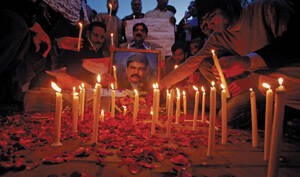The Catholic Bishops’ Conference of Pakistan may formally submit a request to the Holy See to declare Shahbaz Bhatti a martyr at the conclusion of its general assembly in Multan, Punjab, on March 25. Bhatti, a Catholic, was the country’s minister for religious minorities. Bishop Andrew Francis of Multan said: “Bhatti is a man who gave his life for his crystalline faith in Jesus Christ. It is up to us, the bishops, to tell his story and experience to the church in Rome, to call for official recognition of his martyrdom.”
Archbishop Lawrence Saldanha of Lahore said Bhatti’s murder showed how extremist religious parties were gaining the upper hand over a “very weak” Pakistan government. The archbishop, who is president of Pakistan’s Catholic Bishops’ Conference, said the country’s 2.5 million Christians were now increasingly exposed to violence and intimidation from people “whose mind-set is centered more and more on an extremist form of Islam.”
Archbishop Saldanha said, “The murder of Shahbaz Bhatti means that we have lost a great leader of our community who stood up for us and articulated the concerns and fears of our people. We do not have a leader now.” The archbishop said, “Our people are quite down. They are fearful of the future.”
Bhatti was gunned down in a residential district of Islamabad on his way to a cabinet meeting on March 2. He had received numerous death threats because of his criticism of Pakistan’s blasphemy laws. Virginia Farris, a policy adviser for the U.S. Conference of Catholic Bishops’ Office of International Justice and Peace, said the blasphemy laws Bhatti hoped to amend have been widely used to intimidate and abuse Christians and other religious minorities in Pakistan. She said Americans, whose tax dollars are helping support Pakistan’s resistance to Taliban and Al Qaeda power in the nation’s tribal provinces, should be concerned by “this uptick in violence and religious intolerance that minister Bhatti had tried so hard in his life to overcome.”
Farris had worked on a number of occasions with Bhatti. “He struck me as a man who was very principled,” said Farris, “who was trying his darndest under very difficult circumstances to offer hope to [Pakistan’s religious] minorities, to try to stand with them and give them the opportunity to have their voice heard.”
She added, “He was a very courageous man, obviously, because he went back.” She explained that during his last visit to the United States in February for the National Prayer Breakfast at the White House, threats against his life had accumulated and some urged Bhatti to seek refuge in the United States. Bhatti refused. “He said, ‘I have to go back. I have to serve [my] people.’”
Whatever Pakistan’s bishops decide, Bhatti’s martyrdom may already be widely accepted by the community he represented. At Bhatti’s funeral on March 4, thousands of Christians, as well as Hindus, Sikhs and Muslims, joined together in prayer to remember Bhatti’s life and sacrifice.








